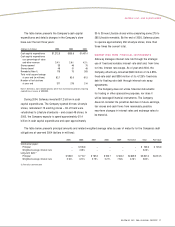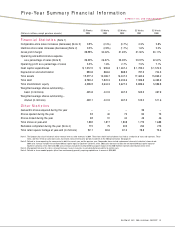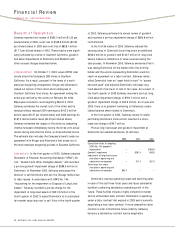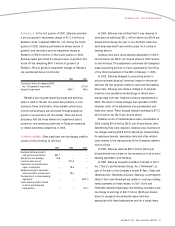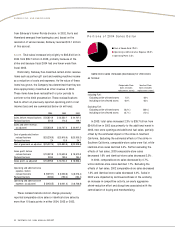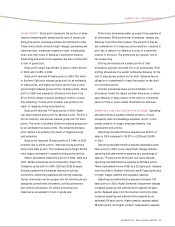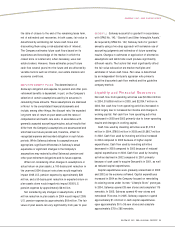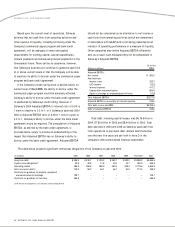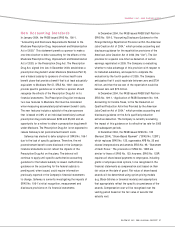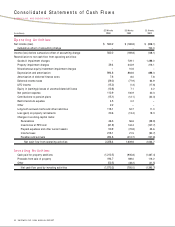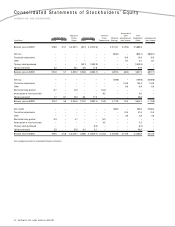Safeway 2004 Annual Report Download - page 29
Download and view the complete annual report
Please find page 29 of the 2004 Safeway annual report below. You can navigate through the pages in the report by either clicking on the pages listed below, or by using the keyword search tool below to find specific information within the annual report.
SAFEWAY INC. AND SUBSIDIARIES
New Accounting Standards
In January 2004, the FASB issued SFAS No. 106-1,
“Accounting and Disclosure Requirements Related to the
Medicare Prescription Drug, Improvement and Modernization
Act of 2003.” This statement permits a sponsor to make a
one-time election to defer accounting for the effects of the
Medicare Prescription Drug, Improvement and Modernization
Act of 2003, or the Prescription Drug Act. The Prescription
Drug Act, signed into law in December 2003, establishes a
prescription drug benefit under Medicare (Medicare Part D)
and a federal subsidy to sponsors of retiree health care
benefit plans that provide a benefit that is at least actuarially
equivalent to Medicare Part D. SFAS No. 106-1 does not
provide specific guidance as to whether a sponsor should
recognize the effects of the Prescription Drug Act in its
financial statements. The Prescription Drug Act introduces
two new features to Medicare that must be considered
when measuring accumulated postretirement benefit costs.
The new features include a subsidy to the plan sponsors
that is based on 28% of an individual beneficiary’s annual
prescription drug costs between $250 and $5,000 and an
opportunity for a retiree to obtain a prescription drug benefit
under Medicare. The Prescription Drug Act is not expected to
reduce Safeway’s net postretirement benefit costs.
Safeway has elected to defer adoption of SFAS No. 106-1
due to the lack of specific guidance. Therefore, the net
postretirement benefit costs disclosed in the Company’s
financial statements do not reflect the impacts of the
Prescription Drug Act on the plans. The deferral will
continue to apply until specific authoritative accounting
guidance for the federal subsidy is issued. Authoritative
guidance on the accounting for the federal subsidy is
pending and, when issued, could require information
previously reported in the Company’s financial statements
to change. Safeway is currently investigating the impacts of
SFAS No. 106-1’s initial recognition, measurement and
disclosure provisions on it’s financial statements.
In December 2004, the FASB issued FASB Staff Position
SFAS No. 109-2, "Accounting Disclosure Guidance for the
Foreign Earnings Repatriation Provision within the American
Jobs Creation Act of 2004,” which provides accounting and
disclosure guidance for the repatriation provisions of the
American Jobs Creation Act of 2004 (the “Act”). The Act
provides for a special one-time tax deduction of certain
earnings repatriated in 2005. The Company is evaluating
whether to take advantage of this provision with respect to
its Canadian subsidiary, and expects to complete the
evaluation by the fourth quarter of 2005. The Company
anticipates that it could repatriate between zero and $734
million, and that the tax cost of the repatriation would be
between zero and $75 million.
In December 2004, the FASB issued FASB Staff Position
SFAS No. 109-1, “Application of FASB Statement No. 109,
Accounting for Income Taxes, to the Tax Deduction on
Qualified Production Activities Provided by the American
Jobs Creation Act of 2004,” which provides accounting and
disclosure guidance on the Act’s qualified production
activities deduction. The Company is currently evaluating
the impact of this guidance on its effective tax rate for 2005
and subsequent periods.
In December 2004, the FASB issued SFAS No. 123
(Revised 2004), “Share-Based Payment” (“SFAS No. 123R”),
which replaces SFAS No. 123, supersedes APB No. 25 and
related interpretations and amends SFAS No. 95, “Statement
of Cash Flows.” The provisions of SFAS No. 123R are
similar to those of SFAS No. 123; however, SFAS No. 123R
requires all share-based payments to employees, including
grants of employee stock options, to be recognized in the
financial statements as compensation cost based on their
fair value on the date of grant. Fair value of share-based
awards will be determined using option-pricing models
(e.g. Black-Scholes or binomial models) and assumptions
that appropriately reflect the specific circumstances of the
awards. Compensation cost will be recognized over the
vesting period based on the fair value of awards that
actually vest.
SAFEWAY INC. 2004 ANNUAL REPORT 27


